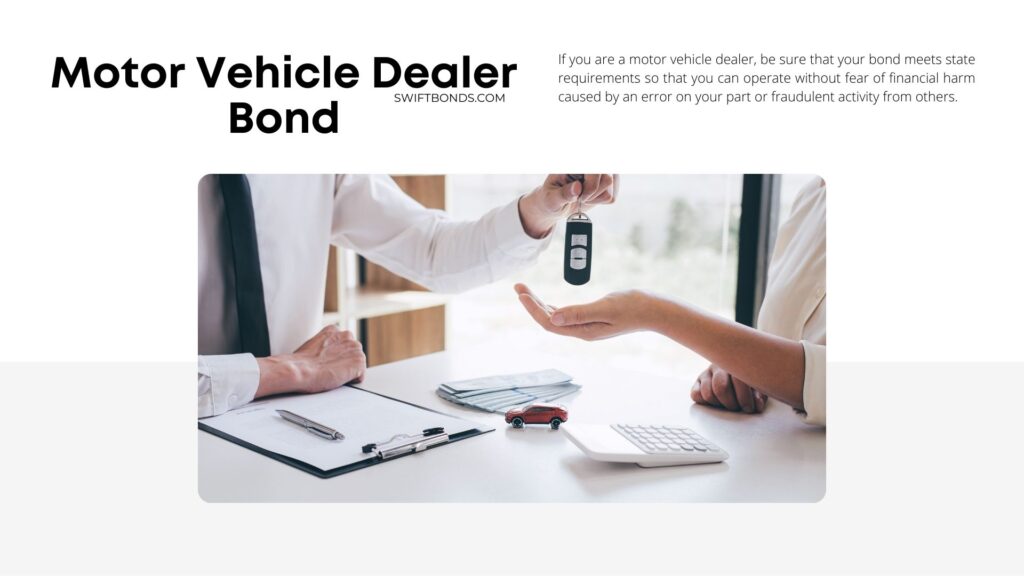
Get An Instant Quote on California Motor Vehicle Dealer Bond ($50,000) Now
Introduction
In California, the automotive industry thrives with countless motor vehicle dealers serving consumers across the state. To safeguard the interests of buyers, sellers, and regulatory bodies, the California Motor Vehicle Dealer Bond ($50,000) stands as a critical requirement. This bond ensures that motor vehicle dealers operate with integrity, adhere to state laws, and protect consumers from fraudulent practices. Let's delve into the specifics of this bond, its purpose, requirements, and significance within California's automotive marketplace.

What is the California Motor Vehicle Dealer Bond ($50,000) and Why Does it Matter?
The California Motor Vehicle Dealer Bond ($50,000) serves as a form of protection for consumers and regulatory authorities. It guarantees that motor vehicle dealers will conduct business honestly, fulfill their contractual obligations, and comply with state regulations governing vehicle sales and dealership operations. Essentially, the bond acts as a financial safeguard, providing recourse for consumers who may suffer financial losses due to dealer misconduct, failure to deliver promised services, or fraudulent activities.
In a state known for its stringent consumer protection laws and active automotive market, the significance of the motor vehicle dealer bond cannot be overstated. By requiring dealers to obtain this bond, California promotes transparency, accountability, and fair business practices, fostering trust among consumers and maintaining the integrity of the automotive industry.
Understanding the Mechanics of the California Motor Vehicle Dealer Bond ($50,000)
So, how does the California Motor Vehicle Dealer Bond ($50,000) function in practice? When applying for a motor vehicle dealer license in California, dealers must secure a bond in the amount of $50,000 from a surety company licensed to operate within the state. This bond remains in effect throughout the dealer's licensing period and ensures compliance with laws governing vehicle sales, advertising practices, consumer rights, and dealership operations.
If a dealer violates state regulations or fails to fulfill contractual obligations, consumers or regulatory authorities may file claims against the bond to seek compensation for financial losses. The bond also serves as a deterrent against unethical behavior, encouraging dealers to uphold high standards of business conduct and protect the interests of consumers.
Navigating Compliance and Consumer Protection
Obtaining and maintaining the California Motor Vehicle Dealer Bond ($50,000) requires dealers to understand and adhere to state laws, regulations, and industry standards. Dealers must work closely with surety companies to secure bonds that meet the California Department of Motor Vehicles' specifications and provide adequate financial protection for consumers.
Additionally, dealers must implement robust compliance programs, transparent sales practices, and ethical business operations to maintain trust and confidence among consumers. Effective communication with regulatory agencies, proactive risk management strategies, and diligent oversight of dealership activities are essential for ensuring compliance with state laws and fostering positive relationships with customers.
Conclusion
In California's commitment to consumer protection and fair business practices, the Motor Vehicle Dealer Bond ($50,000) plays a crucial role in safeguarding consumers' interests and maintaining the integrity of the automotive industry. By requiring dealers to obtain this bond, California strengthens consumer confidence, prevents fraud, and upholds standards of transparency and accountability in vehicle sales and dealership operations. As dealers fulfill their obligations and uphold ethical standards, California continues to lead in promoting a fair marketplace for automotive transactions and protecting the rights of consumers.
Frequently Asked Questions
Can motor vehicle dealers request a waiver or reduction of the $50,000 bond requirement?
While the standard requirement for motor vehicle dealers in California is to obtain a $50,000 bond, there may be uncommon situations where dealers seek a waiver or reduction of this bond amount. This could potentially occur if a dealer can demonstrate exceptional financial stability, a low-risk business profile, or alternative forms of financial security that provide equivalent protection for consumers. Requests for waivers or reductions are evaluated on a case-by-case basis by the California Department of Motor Vehicles (DMV) and may require submission of financial statements, operational history, and justification for the request based on industry standards and regulatory compliance.
Are there provisions for extending the coverage period of the California Motor Vehicle Dealer Bond ($50,000) beyond the standard licensing term?
While the California Motor Vehicle Dealer Bond ($50,000) typically corresponds with the duration of a dealer's licensing period, there may be uncommon instances where dealers seek to extend the bond's coverage period. This could occur if a dealer plans to continue operations beyond the initial licensing term, expand into new markets, or engage in long-term contracts requiring ongoing financial security. Extensions of bond coverage are subject to approval by the DMV and may necessitate payment of additional premiums, updated financial information, and justification for the extension based on business plans and compliance with regulatory requirements.
Can motor vehicle dealers use alternative forms of financial security in lieu of the California Motor Vehicle Dealer Bond ($50,000)?
In certain circumstances, motor vehicle dealers may explore alternative forms of financial security to fulfill the requirements of the California Motor Vehicle Dealer Bond ($50,000). Alternative options could include cash deposits, irrevocable letters of credit, or insurance policies that offer comparable financial protection for consumers and regulatory authorities. However, the acceptance of alternative financial security is uncommon and subject to approval by the DMV. Dealers must demonstrate that the alternative form of security meets or exceeds the protections provided by the surety bond and complies with state regulations governing motor vehicle sales, consumer protection, and dealership operations.

